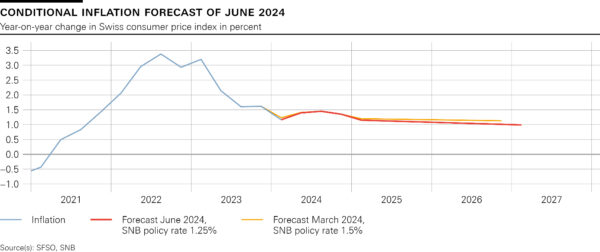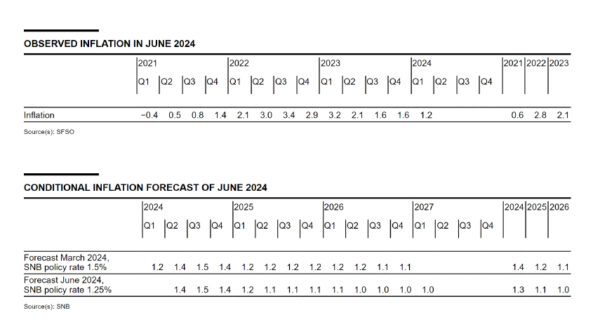The Swiss National Bank is lowering the SNB policy rate by 0.25 percentage points to 1.25%. The change applies from tomorrow, 21 June 2024. Banks’ sight deposits held at the SNB will be remunerated at the SNB policy rate up to a certain threshold, and at 0.75% above this threshold. The SNB is also willing to be active in the foreign exchange market as necessary.
The underlying inflationary pressure has decreased again compared to the previous quarter. With today’s lowering of the SNB policy rate, the SNB is able to maintain appropriate monetary conditions. The SNB will continue to monitor the development of inflation closely, and will adjust its monetary policy if necessary to ensure inflation remains within the range consistent with price stability over the medium term.
Inflation has risen slightly since the last monetary policy assessment, and stood at 1.4% in May. Higher inflation in rents, tourism services and oil products has contributed in particular to this increase. Overall, inflation in Switzerland is currently being driven above all by higher prices for domestic services.
Taking into account today’s policy rate cut, the new conditional inflation forecast is similar to that of March. Over the longer term, it is slightly below the previous forecast. This reflects somewhat lower second-round effects. Over the entire forecast horizon, the conditional inflation forecast is within the range of price stability (cf. chart). The forecast puts average annual inflation at 1.3% for 2024, 1.1% for 2025 and 1.0% for 2026 (cf. table). The forecast is based on the assumption that the SNB policy rate is 1.25% over the entire forecast horizon. Without today’s rate cut, the forecast would have been lower.
Global economic growth was solid in the first quarter of 2024. Inflation largely moved sideways over the past months, and remained above central banks’ targets in many countries. However, the underlying inflationary pressure continued to decrease slightly. Against this background, some central banks eased their monetary policy for the first time following the tightening cycle of the past two years. However, monetary policy remains restrictive in many countries.
Inflationary pressure abroad is likely to continue to ease gradually over the next quarters. At the same time, the global economy is likely to pick up somewhat. However, for the coming quarters the SNB expects only moderate growth in global economic activity by longer-term comparison.
This scenario for the global economy is still subject to significant risks. Inflation could remain elevated for longer in some countries, necessitating a tighter monetary policy there than expected in the baseline scenario. Equally, a renewed increase in geopolitical tensions could result in weaker development of global economic activity.
Swiss GDP growth was moderate in the first quarter of 2024. The services sector continued to expand, while value added in manufacturing stagnated. There was a further slight increase in unemployment. The utilisation of overall production capacity was normal.
Growth is likely to remain moderate in Switzerland in the coming quarters. The SNB anticipates GDP growth of around 1% this year. In this environment, unemployment is likely to continue to rise slightly, and the utilisation of production capacity is set to decline slightly. Over the medium term, economic activity should improve gradually, supported by somewhat stronger demand from abroad. The SNB currently expects growth of around 1.5% for 2025.
The forecast for Switzerland, as for the global economy, is subject to significant uncertainty. Developments abroad represent the main risk.
Momentum on the mortgage and real estate markets in recent quarters has been weaker than in previous years. However, the vulnerabilities in these markets remain.
More detailed information on the monetary policy decision can be found in the introductory remarks of the Governing Board.


